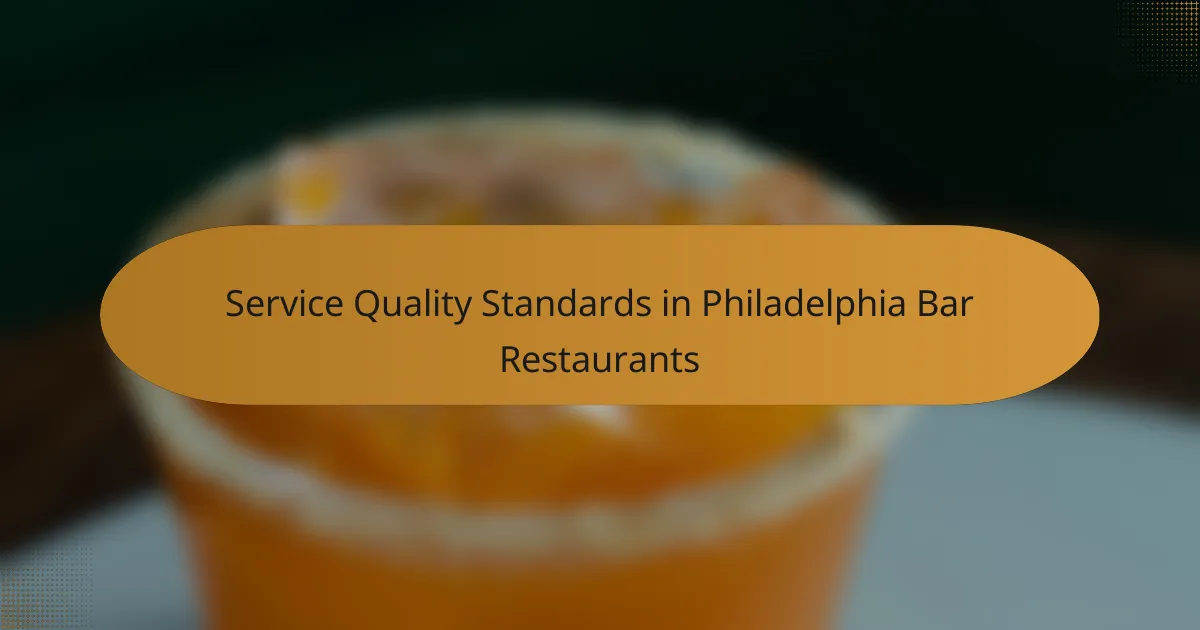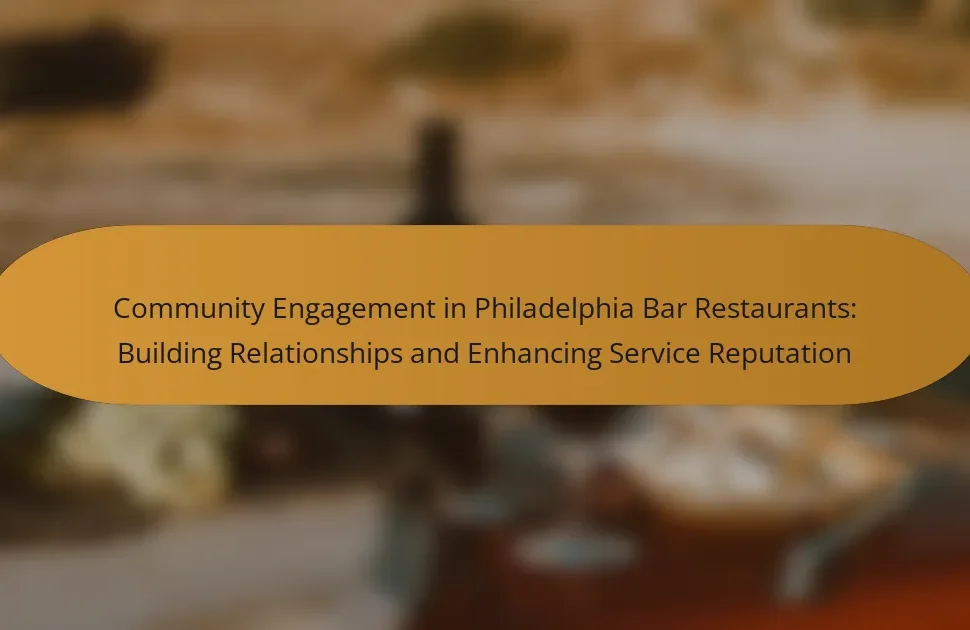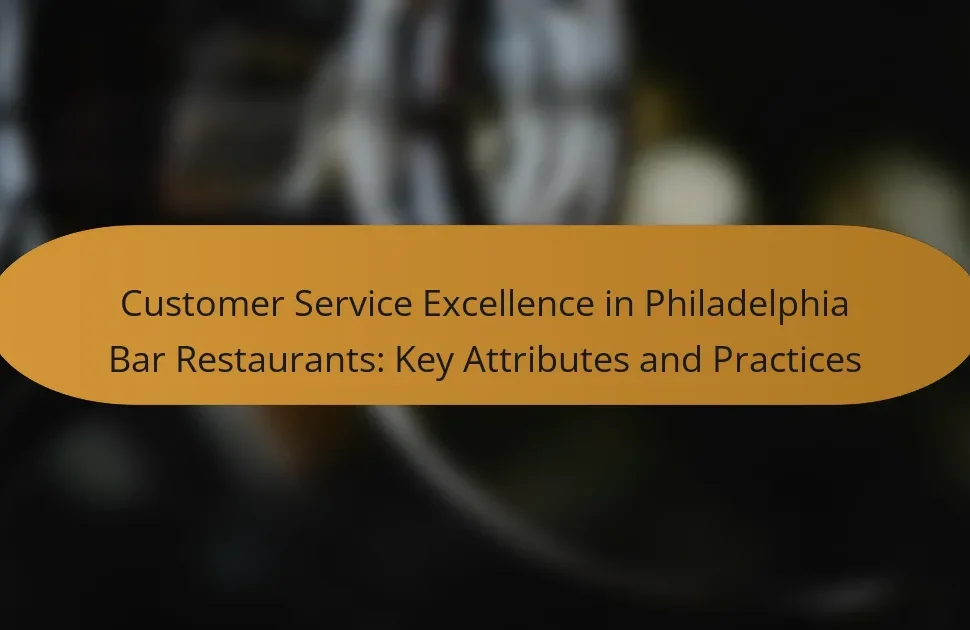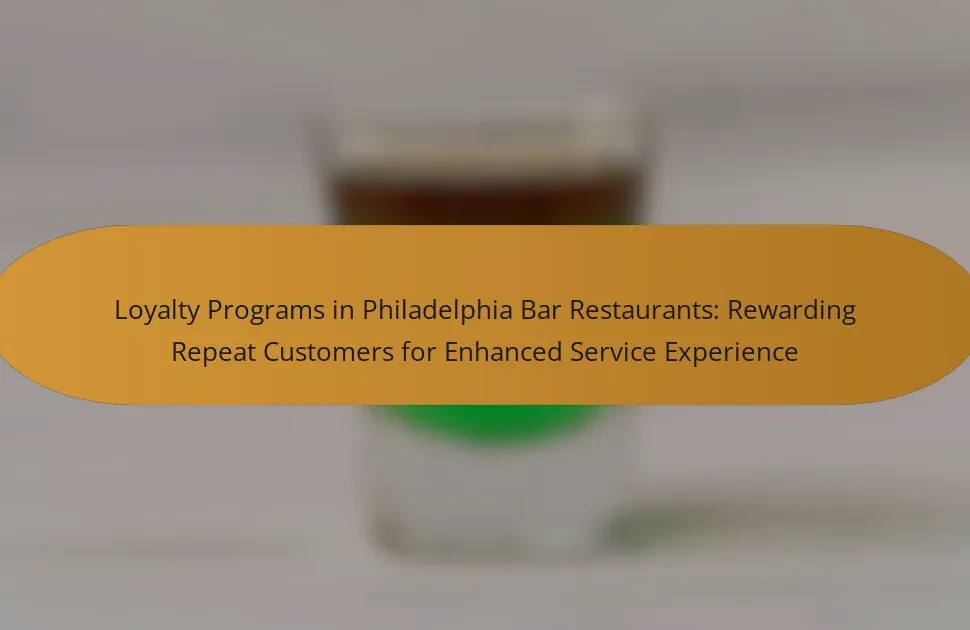
What are Service Quality Standards in Philadelphia Bar Restaurants?
Service quality standards in Philadelphia bar restaurants include consistency, responsiveness, and customer engagement. Consistency ensures that food and service meet expectations every visit. Responsiveness involves timely service and addressing customer needs efficiently. Customer engagement focuses on creating a welcoming atmosphere and personalized interactions. These standards are often reflected in customer satisfaction surveys and industry benchmarks. In Philadelphia, many establishments aim to achieve high ratings on platforms like Yelp and TripAdvisor, emphasizing the importance of these service quality standards.
How are Service Quality Standards defined in the context of bar restaurants?
Service Quality Standards in bar restaurants are defined as the benchmarks for service excellence. These standards encompass various attributes such as responsiveness, reliability, and customer satisfaction. In bar restaurants, service quality is critical for enhancing the overall dining experience. Specific metrics include wait times, staff attentiveness, and the quality of food and beverages served. Research shows that high service quality leads to increased customer loyalty and repeat business. According to a study by the Journal of Hospitality Management, establishments with strong service standards see a 20% increase in customer retention. Thus, service quality standards are essential for success in the competitive bar restaurant industry.
What criteria are used to evaluate service quality in these establishments?
Criteria used to evaluate service quality in Philadelphia bar restaurants include responsiveness, reliability, assurance, empathy, and tangibles. Responsiveness measures how quickly staff respond to customer needs. Reliability assesses the consistency and dependability of service delivery. Assurance involves the knowledge and courtesy of employees, instilling confidence in customers. Empathy reflects the care and personalized attention given to patrons. Tangibles refer to the physical aspects of the restaurant, such as cleanliness and ambiance. These criteria align with the SERVQUAL model, which is widely recognized in the hospitality industry for assessing service quality.
How do these standards impact customer satisfaction?
Service quality standards significantly enhance customer satisfaction in Philadelphia bar restaurants. High standards lead to consistent service delivery, which fosters trust and loyalty among customers. When establishments adhere to these standards, they often see improved service speed and accuracy. This results in a more enjoyable dining experience for patrons. A study by the American Customer Satisfaction Index found that service quality directly correlates with customer retention rates. Furthermore, satisfied customers are more likely to leave positive reviews and recommend the restaurant to others. This creates a positive feedback loop, further boosting the establishment’s reputation and attracting new customers.
Why are Service Quality Standards important for bar restaurants in Philadelphia?
Service Quality Standards are crucial for bar restaurants in Philadelphia to ensure customer satisfaction and loyalty. High service quality leads to positive dining experiences. This, in turn, encourages repeat business and positive word-of-mouth referrals. In a competitive market like Philadelphia, maintaining high standards differentiates a bar restaurant from its competitors. Research shows that 70% of customers are willing to pay more for better service. Moreover, consistent service quality can enhance a restaurant’s reputation, attracting new patrons. Therefore, implementing and adhering to Service Quality Standards is essential for success in the Philadelphia bar restaurant scene.
How do these standards influence business success?
Service quality standards significantly influence business success in Philadelphia bar restaurants. High service quality leads to increased customer satisfaction. Satisfied customers are more likely to return and recommend the establishment. Research indicates that a 5% increase in customer retention can increase profits by 25% to 95%. Consistent service quality enhances the restaurant’s reputation. A strong reputation attracts new customers. Additionally, adherence to service standards can reduce operational inefficiencies. This reduction can lead to lower costs and higher profitability. Therefore, implementing and maintaining high service quality standards is crucial for success.
What role do they play in customer loyalty?
Service quality standards play a crucial role in customer loyalty. High service quality fosters positive customer experiences. Satisfied customers are more likely to return to the establishment. Research indicates that 70% of consumers say they will return if they receive excellent service. Consistent service quality builds trust and reliability. Customers appreciate when their expectations are met or exceeded. This leads to repeat business and referrals. In the competitive bar restaurant industry, service quality is a key differentiator for customer retention.

What are the key attributes of Service Quality Standards in Philadelphia Bar Restaurants?
Key attributes of Service Quality Standards in Philadelphia Bar Restaurants include consistency, responsiveness, and customer engagement. Consistency ensures that service quality remains uniform across all visits. This attribute is vital for building customer trust and loyalty. Responsiveness refers to the staff’s ability to address customer needs promptly. Quick service enhances the overall dining experience. Customer engagement involves creating a welcoming atmosphere and personal interactions. Engaged staff can significantly improve customer satisfaction. Additionally, cleanliness and ambiance are crucial attributes. A clean environment and appealing decor contribute to a positive impression. Finally, staff training and professionalism are essential. Well-trained employees deliver high-quality service, ensuring standards are met consistently.
What specific service quality attributes are most valued by customers?
Customers most value responsiveness, reliability, assurance, empathy, and tangibles in service quality. Responsiveness refers to the willingness to help customers promptly. Reliability involves delivering promised services consistently. Assurance encompasses the knowledge and courtesy of employees, instilling confidence in customers. Empathy signifies the provision of caring and individualized attention. Tangibles include the physical aspects of service, such as cleanliness and appearance. Research shows that these attributes significantly influence customer satisfaction and loyalty in service industries, including restaurants.
How does staff training affect service quality?
Staff training significantly enhances service quality in bar restaurants. Trained staff possess better knowledge of menu items and service protocols. This expertise leads to more efficient service and improved customer satisfaction. According to a study by the American Hotel and Lodging Educational Institute, well-trained employees increase customer retention rates by up to 30%. Additionally, trained staff are more adept at handling customer complaints effectively. This capability fosters a positive dining experience and encourages repeat visits. Overall, comprehensive staff training directly correlates with higher service quality standards in Philadelphia bar restaurants.
What is the significance of ambiance and environment in service quality?
Ambiance and environment significantly influence service quality in bar restaurants. A well-designed ambiance enhances customer experience and satisfaction. Elements such as lighting, music, and decor contribute to the overall atmosphere. Research indicates that 70% of customer satisfaction is linked to the environment. A pleasant environment encourages longer visits and repeat patronage. Additionally, ambiance can affect staff performance and customer perceptions of service. In Philadelphia bar restaurants, creating an inviting atmosphere is crucial for attracting and retaining customers.
How do Philadelphia bar restaurants measure their service quality?
Philadelphia bar restaurants measure their service quality using customer feedback, staff training, and performance metrics. They often deploy surveys to gather direct input from patrons. This feedback helps identify areas for improvement. Staff training programs focus on enhancing service delivery skills. Performance metrics include wait times, order accuracy, and customer satisfaction ratings. Many establishments analyze online reviews to gauge public perception. Additionally, mystery shoppers may be employed to evaluate service standards anonymously. These methods collectively ensure that bar restaurants maintain high service quality.
What methods are commonly used for gathering customer feedback?
Surveys are commonly used for gathering customer feedback. They can be administered online, via email, or in-person. Surveys typically include questions about customer satisfaction and service quality. Focus groups are another method for collecting feedback. They involve discussions with a small group of customers. Interviews provide in-depth insights into customer experiences. Social media platforms allow customers to share feedback publicly. Reviews on websites also serve as a feedback mechanism. Each of these methods helps businesses understand customer preferences and improve service quality.
How can bar restaurants utilize performance metrics to improve service quality?
Bar restaurants can utilize performance metrics to improve service quality by analyzing customer feedback, service speed, and staff efficiency. Customer feedback metrics, such as ratings and reviews, provide insights into guest satisfaction. Monitoring service speed helps identify bottlenecks in order fulfillment. Staff efficiency metrics, including table turnover rates, reveal how well employees manage their tasks.
Implementing regular training sessions based on these metrics enhances staff skills. For example, a study by the National Restaurant Association found that training can increase customer satisfaction by up to 20%. Additionally, tracking sales data alongside service metrics can highlight trends that inform menu adjustments. This data-driven approach enables bar restaurants to make informed decisions that elevate the overall dining experience.
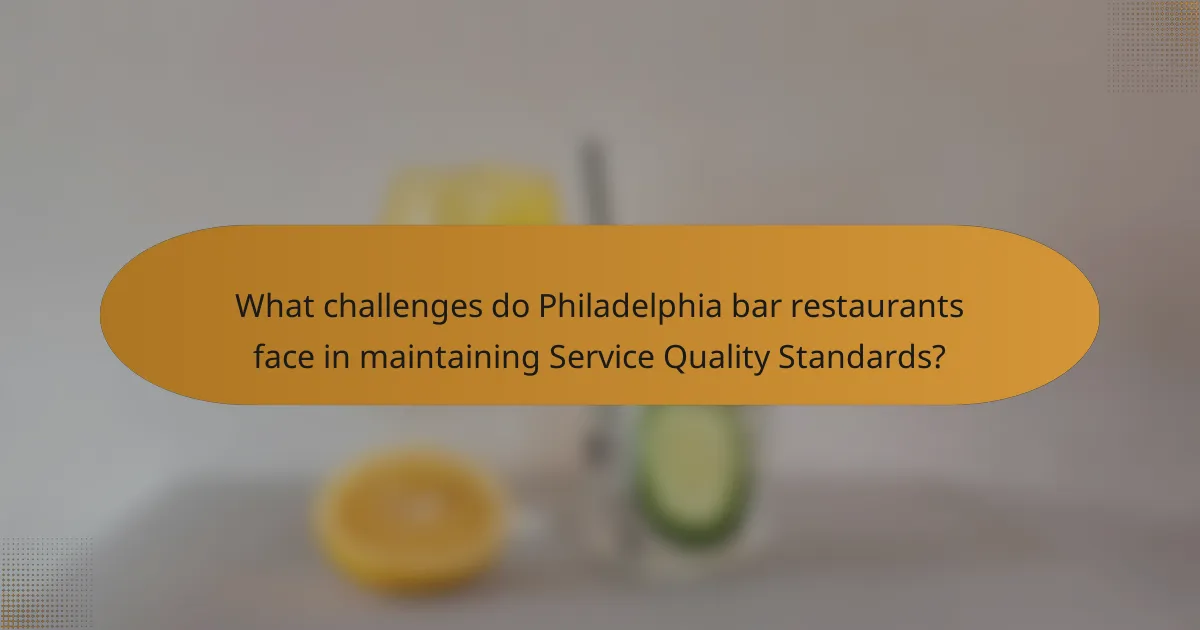
What challenges do Philadelphia bar restaurants face in maintaining Service Quality Standards?
Philadelphia bar restaurants face challenges in maintaining service quality standards due to high employee turnover. The restaurant industry experiences an average turnover rate of 70% to 80%. This instability can lead to inconsistent service experiences for customers. Additionally, many establishments struggle with training new staff effectively. Inadequate training can result in poor customer interactions and service errors.
Another challenge is the competitive market. Philadelphia has a vibrant dining scene, making it essential for bar restaurants to differentiate themselves. They must continuously innovate their service offerings to attract and retain customers. Economic fluctuations also impact customer spending habits. During downturns, patrons may prioritize affordability over service quality, pressuring restaurants to adjust their standards.
Lastly, maintaining a cohesive team culture is difficult. Diverse staff backgrounds can lead to varying interpretations of service quality. This inconsistency can affect overall customer satisfaction. Therefore, Philadelphia bar restaurants must navigate these challenges to uphold service quality standards effectively.
What common obstacles hinder service quality in bar restaurants?
Common obstacles that hinder service quality in bar restaurants include staff shortages, inadequate training, and poor communication. Staff shortages can lead to longer wait times and decreased customer satisfaction. Inadequate training results in employees being unprepared to handle customer needs effectively. Poor communication among staff can cause mistakes in orders and service delays. According to a study by the National Restaurant Association, 75% of restaurant owners report that staffing issues directly impact service quality. Additionally, a lack of proper management oversight can exacerbate these issues, leading to inconsistent service experiences.
How can staffing issues affect service quality?
Staffing issues can significantly affect service quality in bar restaurants. Inadequate staffing leads to longer wait times for customers. This can result in decreased customer satisfaction. High employee turnover can disrupt service consistency. New staff may lack experience, impacting service efficiency. Insufficient training due to staffing shortages can lead to mistakes. These mistakes can frustrate customers and diminish their dining experience. Research shows that restaurants with optimal staffing levels report higher customer satisfaction ratings. For example, a study by the National Restaurant Association indicates that well-staffed establishments see a 20% increase in repeat customers.
What external factors influence service quality standards?
External factors influencing service quality standards include customer expectations, competitive landscape, regulatory requirements, and technological advancements. Customer expectations shape service quality through their experiences and feedback. The competitive landscape drives businesses to meet or exceed industry standards to attract patrons. Regulatory requirements, such as health and safety laws, set minimum service quality benchmarks that establishments must follow. Technological advancements enable improved service delivery, enhancing customer satisfaction. These factors collectively impact how Philadelphia bar restaurants define and implement their service quality standards.
How can bar restaurants in Philadelphia enhance their service quality?
Bar restaurants in Philadelphia can enhance their service quality by implementing staff training programs. Training improves staff knowledge about menu items and customer service techniques. Well-trained staff can provide faster and more accurate service. Another approach is to solicit customer feedback regularly. Feedback helps identify areas needing improvement. Additionally, maintaining a clean and welcoming environment is essential. Studies show that cleanliness positively impacts customer satisfaction. Finally, offering personalized experiences can create a loyal customer base. Personalization can include remembering regulars’ preferences. These strategies collectively contribute to improved service quality in bar restaurants.
What best practices can be implemented to improve customer service?
Implementing best practices to improve customer service includes training staff effectively. Staff training enhances product knowledge and service skills. This leads to better customer interactions. Additionally, actively seeking customer feedback is crucial. Feedback helps identify areas for improvement. Using technology to streamline service can also enhance efficiency. For example, point-of-sale systems can speed up transactions. Establishing a customer service policy sets clear expectations for staff. Consistency in service delivery builds customer trust. Finally, recognizing and rewarding excellent service motivates staff to perform better. These practices collectively contribute to a positive customer experience.
How can technology be leveraged to enhance service quality?
Technology can be leveraged to enhance service quality by streamlining operations and improving customer interactions. Automated ordering systems reduce wait times and minimize errors. Customer relationship management (CRM) software personalizes service, leading to higher satisfaction. Mobile payment solutions facilitate quick transactions, enhancing convenience. Data analytics provide insights into customer preferences, enabling tailored offerings. Online reservation systems optimize seating arrangements and manage customer flow efficiently. Real-time feedback tools allow for immediate service adjustments, ensuring continuous improvement. These technological advancements collectively contribute to a more efficient and satisfying dining experience in Philadelphia bar restaurants.
What are the future trends in Service Quality Standards for Philadelphia Bar Restaurants?
Future trends in Service Quality Standards for Philadelphia Bar Restaurants include enhanced customer experience, personalization, and technology integration. Establishments are increasingly focusing on providing tailored services to meet individual customer preferences. This trend is supported by the growing demand for unique dining experiences. Additionally, the use of technology, such as mobile ordering and contactless payments, is becoming standard. These innovations streamline service and improve efficiency. Data analytics is being utilized to assess customer feedback and service performance. This allows restaurants to continuously refine their service quality. Sustainability practices are also gaining traction, with restaurants aiming to reduce waste and source local ingredients. These trends reflect a shift towards a more customer-centric and environmentally responsible approach in the industry.
How is customer behavior changing in relation to service expectations?
Customer behavior is increasingly demanding higher service expectations in Philadelphia bar restaurants. Consumers now prioritize personalized experiences and prompt service. They expect staff to be knowledgeable about menu items and drink pairings. Online reviews significantly influence their choices and perceptions of service quality. Additionally, customers are more likely to share their experiences on social media platforms. This trend has led restaurants to adapt by enhancing training programs for staff. Data from the National Restaurant Association indicates that 78% of diners consider service quality a key factor in their dining experience. As a result, bar restaurants are investing more in customer service initiatives to meet these evolving expectations.
What innovations are emerging in the service industry that may affect standards?
Emerging innovations in the service industry include automation, artificial intelligence, and enhanced customer experience technologies. Automation streamlines operations, reducing wait times and increasing efficiency. For example, self-service kiosks in restaurants enable customers to place orders independently. Artificial intelligence personalizes customer interactions, using data to tailor recommendations and improve satisfaction. Enhanced customer experience technologies, such as mobile apps, facilitate seamless ordering and payment processes. According to a report by Deloitte, 80% of consumers prefer personalized experiences, indicating the demand for these innovations. These advancements collectively raise service standards by improving speed, personalization, and overall customer satisfaction.
What practical tips can bar restaurants follow to uphold high Service Quality Standards?
Bar restaurants can uphold high Service Quality Standards by implementing several practical tips. First, staff training is essential. Regular training ensures that employees are knowledgeable about menu items and service protocols. Second, maintaining cleanliness is crucial. A clean environment enhances customer satisfaction and reflects professionalism. Third, effective communication with customers is vital. Listening to customer feedback helps address concerns promptly. Fourth, prompt service is necessary. Fast and efficient service can significantly improve the dining experience. Fifth, consistency in service quality builds trust. Customers return when they know what to expect. Lastly, leveraging technology can streamline operations. Point-of-sale systems improve order accuracy and speed. These strategies collectively enhance the service experience in bar restaurants, fostering customer loyalty and positive reviews.
Service Quality Standards in Philadelphia Bar Restaurants encompass key attributes such as consistency, responsiveness, and customer engagement, which are essential for enhancing customer satisfaction and loyalty. These standards are evaluated through criteria like reliability, assurance, empathy, and tangibles, significantly influencing the overall dining experience. High service quality not only fosters trust among patrons but also boosts business success through increased customer retention and positive word-of-mouth. The article will explore the definition, evaluation criteria, impact on customer satisfaction, challenges faced, and future trends in service quality standards within this competitive dining landscape.
